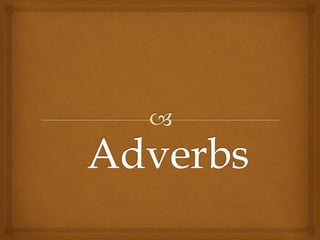
3. unit 6,adverbs(1)
- 2. ADVERBS Adverbs are words used to describe or modify verbs. Adverbs give more information about a verb. Use adverbs to make your writing more interesting. Adverbs are words that modify a verb (He drove slowly. — How did he drive?) an adjective (He drove a very fast car. — How fast was his car?) another adverb (She moved quite slowly down the aisle. — How slowly did she move?) As we will see, adverbs often tell when, where, why, or under what conditions something happens or happened. Adverbs frequently end in -ly; however, many words and phrases not ending in -ly serve an adverbial function and an -ly ending is not a guarantee that a word is an adverb. The words lovely, lonely, motherly, friendly, neighborly, for instance, are adjectives: That lovely woman lives in a friendly neighborhood.
- 3. POINTS TO BE NOTED 1. If the adjective ends in -y, replace it with -i and then add -ly. Adlective Adverb Happy Happily Angry Angrily Lucky Luckily 2. If the adjective ends in -able, -ible, or -le, replace the -e with -y. Adlective Adverb probable probably gentle gently humble humbly
- 4. 3. If the adjective ends in -ic, add -ally. Adlective Adverb basic basically economic economically This rule, however, has an exception. The adverb formed from public is publicly, and not publically.
- 5. Adverbs of manner say how something happens or is done. Examples are: happily, angrily, slowly, carefully, fast etc. She walked slowly. John drove carefully. The soldiers fought bravely. ADVERBS OF MANNER
- 6. POSITION Adverbs of manner normally go in end position (at the end of a clause). She sang well. He talked loudly. She walked slowly. He managed it skillfully. She speaks English well.
- 7. ADVERBS OF PLACE Adverbs of Place tell us where something happens. Examples are: upstairs, here, there, nearby, everywhere, in, out etc. She looked for him everywhere. Please come in. They bought a house nearby. He lives here. The boss has gone out. He was seen nowhere.
- 8. POSITION They are normally placed at the end of a clause. She took him out. They all went away. We went ahead. The children were playing upstairs. He jumped out.
- 9. ADVERBS OF INDEFINITE FREQUENCY Position Explanation Points To Be Noted
- 10. EXPLANATION Adverbs of indefinite frequency tell us how often something happens. Common examples are: always, ever, usually, normally, often, frequently, seldom, never etc. I am never late for office. Have you ever been to the US? I often work late.
- 11. POSITION Adverbs of indefinite frequency go in mid position. They are normally placed after the auxiliary verbs and before other verbs. When there are two auxiliary verbs, the adverb goes after the first. I always get up early. (adverb + main verb) I am seldom late for work. (is/am/are/was/were + adverb) We frequently visit them. (adverb + main verb) I often read comics. (adverb + main verb) I have never seen a dolphin. (auxiliary verb + adverb + main verb)
- 12. FOCUSING ADVERBS Focusing adverbs point to a particular part of a clause. Most common examples are: also, just, even, only, mainly, mostly, either, neither etc. Position As focusing adverbs point to a particular part of a sentence, the meaning conveyed often depends upon their position. It is best to place them in front of and next to the word or words modified by them. Compare: Only John helped me to buy the house. (= Only John and no one else helped me.) John only helped me to buy the house. (= John helped me to buy the house, but didn't actually buy it for me.)
- 13. ADVERBS OF PURPOSE Adverbs of Degree Adverbs of Certainty
- 14. ADVERBS OF DEGREE Adverbs of Degree tell us about the degree or extent of an action, quality or manner. Examples are: almost, little, enough, much, too, partly, fully, so, rather, quite, nearly, just, too, hardly, scarcely, very etc. She is very beautiful. I am extremely sorry. She is quite strong. They are fully prepared.
- 15. ADVERBS OF CERTAINTY Adverbs of certainty express how certain or sure we feel about an action or event. Common examples are: certainly, definitely, probably, undoubtedly, clearly, obviously etc. He is undoubtedly a great leader. There is clearly something wrong. She is definitely taller than you.
- 16. ADVERBS OF TIME AND DEFINITE FREQUENCY Adverbs of time and definite frequency tell us when something happens. Examples are: today, yesterday, later, now, all day, not long, for a while, since, last year, sometimes, frequently, never, often, yearly etc. shall go there tomorrow. You must get up early. I have seen him before. Let us start now.
- 17. ANY QUESTIONS?
